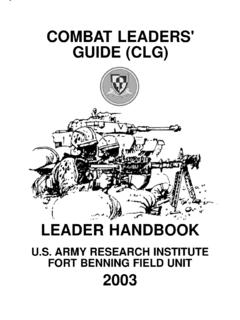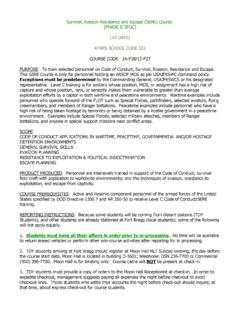Transcription of Candidates take first steps toward new career
1 The Making of a Warrant Officer Candidates take first steps toward new career by WO1 T. Alan Moore FORT RUCKER, Ala. ( army News Service, Jan. 9, 2001) -- With his chin resting on his fist, Warrant Officer candidate Karl Perkins sat at a table contemplating what was about to happen. He had checked and rechecked his list of required items. All of his gear, properly stenciled with his last name, was packed and ready to go. At any minute, he would meet the cadre of the 1st Warrant Officer Company -- the training, advising and counseling officers that would control his every waking moment for the next six weeks. The mood among the Candidates of Class 01-03, all 72 of them, was a blend of nervous giddiness, and anxiety with a hint of dread. The tension was undeniable. If any were eager to begin training, it was only because they were eager to finish. "There is anxiety, of course," said Perkins. "But it's a good anxiety, a good stress. I just keep telling myself this is the very first step in a new beginning.
2 " In preparation for the move from being "Snowbirds" at the Headquarters Company where they inprocessed, to becoming full resident- Candidates at the 1st Warrant Officer Company, the class leadership devised a good plan. They had already been briefed that they would have to carry their bags from the HHC building to the barracks across the street at 1st WOC. The class leadership decided to stockpile all their equipment into a single room near the hallway entrance, in the hopes of saving time and sweat later when the TAC officers would no doubt be demanding that things happen more quickly. The HHC executive officer, CW3 Michael Ellis, discovered that the Candidates had transferred the bags without permission and ordered that each be returned to its original room. The Candidates tried to keep positive as they scurried to "undo" all the work they had just put into prepositioning their equipment. Move Out The move began when the TAC team leader, CW2 Ira Brown, ordered the class leader to hold an accountability formation.
3 From that point on, the Candidates have no class colors, they are not allowed to carry a guidon, drink caffeine, phone home, talk during meals or even call cadence. Until otherwise earned, a candidate has no rights at all. Brown, a no-nonsense TAC Officer, has little patience for anything that isn't within the standards of the WOC Guide -- the Candidates ' bible and survival manual. Within the first 15 minutes, he dismissed six or seven class leaders for various displays of incompetence or for violations of the regulations. "I'm in the hiring and firing business today," Brown told the Candidates . "Who is going to step up and lead this class? How about you, candidate ," he said pointing to an unsuspecting troop in the first rank. "You're my new class leader." As soon as the candidate opened his mouth with, "Sir, yes sir," he was wrong. Brown let him off with a correction, "How about sounding off with, 'Sir, candidate your last name.' I'm pretty sure that's what the WOC Guide says.
4 I don't know though I could be wrong." He wasn't of course, but he had made his point. After a series of routine questions: anyone on profile? Does any one not want to be here? Any one in a relationship with an enlisted soldier? Brown then handed the class leader a written order to read aloud. In general, the order directed a move within one hour. Then it went into specifics -- Candidates would carry one bag at a time -- in the left hand so that it would still be possible to salute each officer they encountered along the way. Somewhere in the order it was mentioned that all personnel items would be displayed in accordance with the WOC Guide and that before bedtime a ROC would be displayed. "Does anyone not understand these instructions," the class leader asked. When no one spoke up, it was evident to the TAC team that the class, without really even knowing what a ROC (room occupancy card) was, had agreed to a mission they didn't fully understand. It was perhaps their first lesson as a class, a mistake for which they may later have to explain.
5 Exhausted from the move, the Candidates spent the first night organizing their wall locker displays and wondering what tomorrow -- the first official training day toward becoming a warrant officer -- would bring. Warrant Candidates begin with stress evaluation On day one, the wake-up call was led by Chief Warrant Officer 4 Christopher Dodd, commander of the 1st Warrant Officer Company. About half a dozen of his Training, Advising and Counseling officers, or TAC officers, all in PT attire, waited at the bottom of the stairs for the clock to tick it's way to 0430. Upstairs, 72 Candidates , snug in their bunks, were blissfully unaware that the wake-up committee was assembling. At precisely 0430, the wake up crew followed Chief Warrant Officer 2 Ira Brown, the TAC team leader for Class 2001-03, as he ascended the stairwell. Carrying a bullhorn, a clipboard and a class roster, Brown tiptoed into the long hallway and engaged the siren on the bullhorn. An ear-piercing wail shattered the silence of slumber and filled the air with instant chaos and urgency.
6 The siren's scream jarred the Candidates to the realization of training day 1 -- stress day. "Get up! Get Up," the TACs barked. "Get on the wall!" Sleepy heads stumbled from their beds. Each weary body, fueled by a sudden burst of adrenaline, appeared to move 10 times faster than the brain. The Candidates lined themselves on the wall outside their rooms. Ideally, the Candidates would all come to the rigid position of attention -- every head, rump, and heel touching the wall, in accordance with the Warrant Officer Candidates ' Guide. That didn't happen. The day's objective and subjective assessments of the Candidates have begun. Brown writes notes on his clipboard. As the team of TAC officers walked up and down the hallway, very few of them were given the greeting of the day. Candidates , not three feet from the commander, failing to give him the courtesy of the greeting of the day? Unbelievable. Time is wasting -- 0440 The members of the class were given six minutes to brush their teeth, perform personal hygiene and change into PT shirts, BDU pants and running shoes.
7 All watches and jewelry would be secured in the wall lockers, it was ordered. Furthermore, every candidate would report back on the wall with their military identification card in their right back pocket and each would wear their dog tags and carry a full canteen of water. Brown is notorious for issuing detailed orders and demanding that a list of actions to be taken immediately. It's all part of evaluating whether or not Candidates listen to what they're being asked to do, whether or not they pay attention to detail, he said. He and the TAC team are trying to stress out the Candidates . It was working. "We deliberately put too many tasks on them because we want to see how they prioritize, how they deal with those demands," Brown admits. "The first two weeks of training are very high stress, some of that comes from the TAC officers, most of it comes from the Candidates not living up to the standards." Most of these Candidates have impeccable records as NCOs, they were solid performers in their field or else they wouldn't have been selected to be a WOC.
8 But, Brown is quick to point out, the demands upon an officer are very different, making it possible that a few stellar NCOs might make substandard officers. That's where subjective evaluations come into play at the WOCS. "Times up, why are you not already on the wall," asked a TAC officer who had been watching the clock. The Candidates scurried into position, but it was too late. Several Candidates came out of their rooms wearing a canteen on their pistol belts. That was not what the TAC officers wanted to see, they specifically said Candidates would "carry a full canteen of water." This was failure to follow instructions. Only 15 minutes into the first day of training and already things were not going very well. first Formation -- 0451 The Candidates were trying to get themselves into a formation for accountability. The class first sergeant called for the count, but he botched the command of execution. To make matters worse, the squad leaders accepted the incorrect command and began to report any way.
9 Another red mark on the class record. When the class PT officer displayed some difficulty in extending the formation for stretching and warm-up exercises, the senior TAC officer, CW3 Norbert Schmidt took over. "You know it's a sad day when I have to take over this formation because you don't know what the regulations say about drill and ceremony," he told the Candidates . Moving out -- 0509 Eventually, the Candidates lined in three ranks set out on the first day of physical training. A mile down the road, they gathered on a baseball field for countless push-ups, sit-ups and grass drills. After more than an hour and a half of intense PT led by the TAC officers, they ran back to the company area Just when the Candidates were convinced it was over for the day, the TAC team took them on a one-mile jaunt to the infamous "pit." The pit is a red clay depression about the size of a football field, where Candidates did more exercises with rifles and still more grass drills -- roll left, get up, get down, roll right.
10 When the Candidates started to get tired, the TAC team was relentless in applying the stress. "How can you come to an officer producing school in such sad physical condition," asked a TAC officer. What may seem like hazing to an outsider is anything but, said CW2 Aaron Graff, a TAC officer who is on the first training day for the 50th time. "Absolutely not," he said. "Everything we do here is a tool for evaluating these Candidates . In order to really assess their leadership ability, we have to put them in stressful situations. We can't shoot live rounds at them, but to get an understanding of how they might perform in combat, we look at how they perform when they are physically, mentally and emotionally tired." The stress, the PT, the confusion, everything, right down to the bullhorn wake-up call is all part of the master plan to assess Candidates , said Brown. "We are looking for leaders who are accountable and responsible for their actions and decisions," he said.





